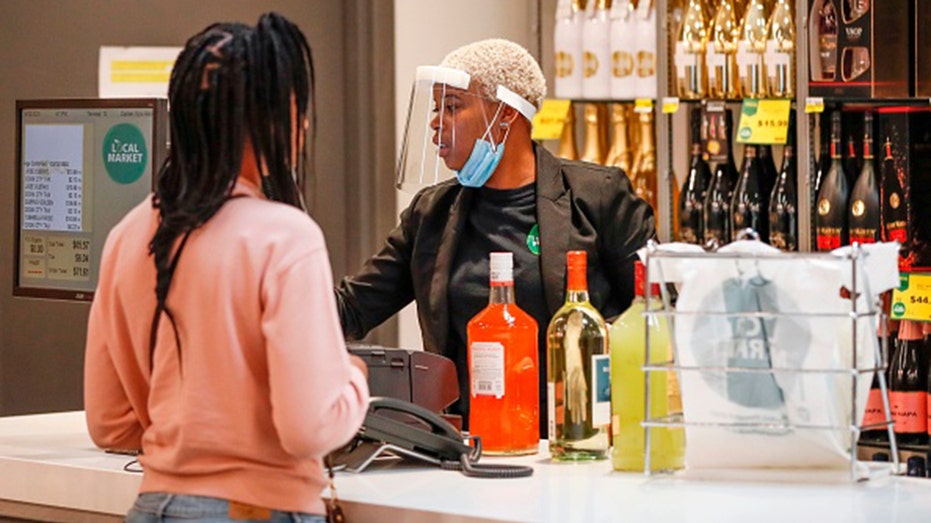Can companies be liable for coronavirus when employees return to work?
Employers can be cited for violating Occupational Safety and Health Act
Get all the latest news on coronavirus and more delivered daily to your inbox. Sign up here.
Companies want to reopen for business, but employees want to be guaranteed that they will be safe from coronavirus in the workplace.
During a coronavirus task force briefing Monday, President Trump said the administration would like to avoid making companies face liability if employees who are sent back to work contract the virus while on the job.
“We had tried to take liability away from these companies," Trump said. "We just don’t want that. We want the companies to open, and to open strong.”
A debate is underway on how to accomplish that.
White House economic adviser Larry Kudlow touched on the situation on Tuesday.
"It is something we are looking at carefully," said Kudlow. He offered no oher details.
He did elude to it might be an issue addressed more on the state or city level.
The U.S. Chamber of Commerce, National Association of Manufacturers and National Federation of Independent Business are seeking temporary, legal and regulatory safe harbor legislation to curb liabilities for employers, according to Reuters.
CORONAVIRUS CONTRACT DISPUTES START HITTING THE COURTS
According to the Occupational Safety and Health Act’s general duty clause, employers are required to provide their employees "a place of employment which are free from recognized hazards that are causing or are likely to cause death or serious physical harm to his employees.”
The federal Occupational Safety and Health Administration (OSHA) can cite employers for violating the general duty clause if there is a recognized hazard and they do not take reasonable steps to prevent or abate it. However, OSHA citations can only be based on standards, regulations, or the general duty clause.
In the event that an employee contracts the virus through exposure at work, global law firm Seyfarth-Shaw says employees are entitled to receive "temporary total disability benefits in lieu of wages, reasonable and necessary medical treatment and an award for any resulting permanent disability."
PRESSURE MOUNTS ON INSURANCE COMPANIES TO PAY OUT FOR CORONAVIRUS
In a letter published by United States Chamber of Commerce President Suzanne Clark last week, she outlined the criteria for what a safe workplace should look like when businesses reopening. She said a safe workplace requires the use of personal protective equipment (PPE) such as masks, respirators and physical barriers and that employers can face lawsuits for a limited supply or lack of training of PPE.
"OSHA requires employers to be responsible for ensuring the availability of such equipment and training employees on the use of the equipment," Clark said.
She added, however, that it would be nearly impossible for every employer to make PPE available once the country reopens due to a lack of supplies, and that the federal government needs to clarify the "scope of liability for the provision (or inability to provide due to scarcity) of PPE."
"This is simply not possible if PPE becomes recommended in all workplaces," Clark said. "The federal government should make clear that PPE recommended specifically to combat the spread of COVID-19 is not subject to the normal OSHA requirements around workplace PPE."

An employee wearing a face mask rings up a customer's alcohol purchase at the Local Market Foods store in Chicago, Illinois, on April 8, 2020, during the coronavirus outbreak. (KAMIL KRZACZYNSKI/AFP via Getty Images)
According to Clark, the core argument for claims related to the coronavirus is that "a customer/employee/patient/member of the public/etc. was exposed to COVID-19 in a business facility or as the result of a business’ particular action, or failure to act, and then that claimant became sick."
Claims employees can make can range anywhere from simple negligence to strict liability to public nuisance.
She adds that proving cause may be a challenge depending on the claim being made, but that "if enough claims are brought, the scope and magnitude of the litigation still may exert enough pressure to threaten businesses or industries with bankruptcy."
She warned that the threat of the exposure-related lawsuits may deter some businesses from reopening "even after it is determined that they could safely operate by following the guidance of appropriate health authorities."
Clark recommends that business owners should take claims to federal court rather than state court in order for policy reforms to be made.
GET FOX BUSINESS ON THE GO BY CLICKING HERE
The Society for Human Resource Management (SHRM) notes that OSHA will look to the CDC as the authority when issuing coronavirus-related citations.
"The agency will determine whether the employer's industry knows that exposure to infected individuals in the workplace is a hazard," the SHRM said in a statement on its website. "If so, the agency would expect the employer to take feasible measures to protect the employees and, if it not does not take such action, the employer could be subject to citation."
The SHRM recommends employers conduct a hazard assessment for potential exposures and develop an action plan that includes "hazard identification, hazard prevention procedures, employee training, medical monitoring surveillance and recordkeeping."
If employers are aware of any potential threat of coronavirus to their employees or customers, they should report it to the OSHA immediately.
CLICK HERE TO READ MORE ON FOX BUSINESS
According to the latest report by the U.S. Department of Labor, 5.2 million workers have filed for their first week of unemployment benefits for the week ending in April 11, bringing the total number of Americans who have filed initial jobless claims to around 22 million, or roughly 13.5 percent of the labor force, since March 14.
There are more than 784,000 confirmed coronavirus cases in the United States, according to the latest update by Johns Hopkins University.
This story was updated on April 21 to include Kudlow comments.




















